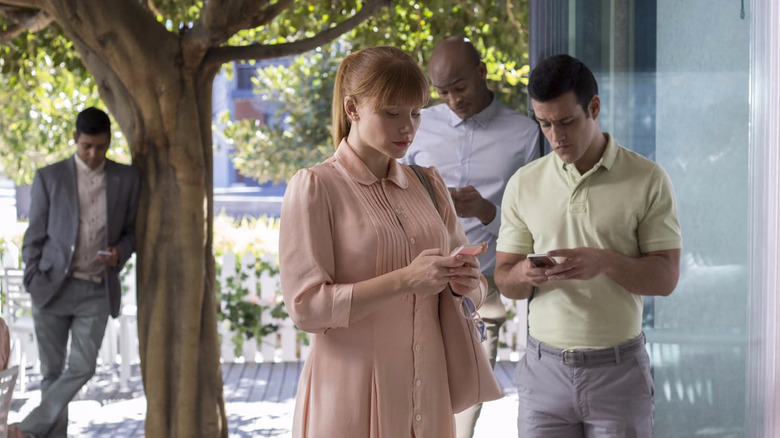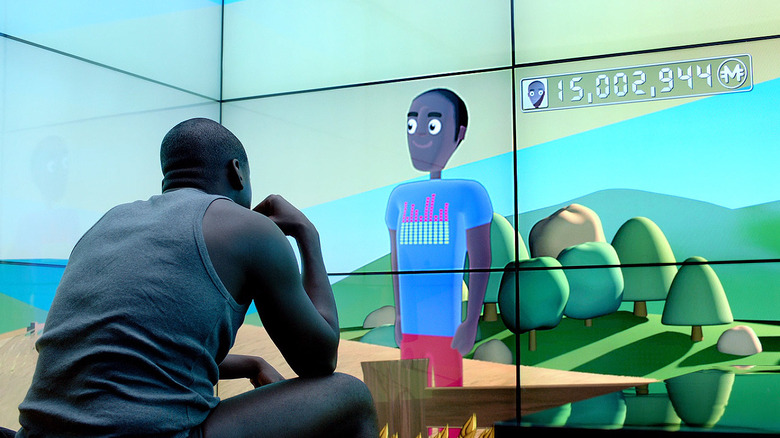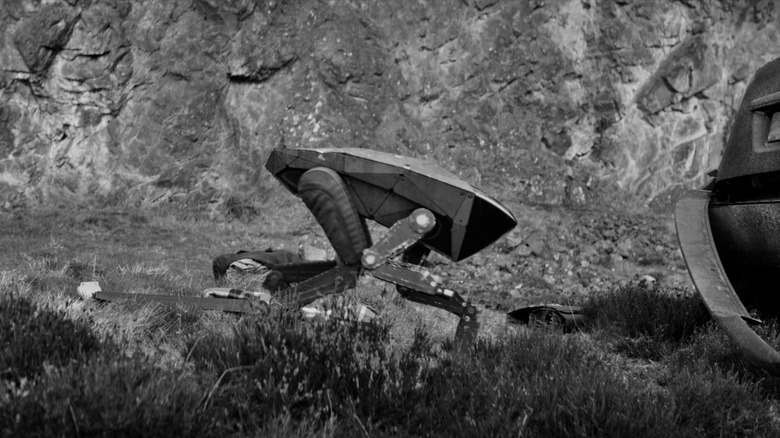6 Times Black Mirror Eerily Predicted The Future
"Black Mirror" has always had the uncanny ability to walk the line between relatable and futuristic. Its creators manage to seamlessly weave new, exciting, and terrifying technologies and cultural concepts into situations that are shockingly close to what we're seeing as the 21st century unfolds. Often, this starts with a mundane or at least easily understandable situation, like an unsavory political candidate, a strained marriage, or the loss of a loved one. Then, the show will add in a twist (or let viewers do so with episodes like "Bandersnatch") that takes things in an unexpected direction.
This is fun all on its own, but you can find that kind of writing in a lot of sci-fi shows. What makes Netflix's dark sci-fi anthology special is its ability to eerily predict the future. Time and again, the show has used the inevitable march of technology to suggest fictional situations that we subsequently see play out in the real world. Don't believe us? Here are just a few of the most obvious examples in the show's long-running history so far.
1. Be Right Back predicted AI-resurrected loved ones
The first episode of season 2, "Be Right Back," aired way back in 2013. It depicts a bereaved and pregnant Martha (Hayley Atwell), who processes the loss of her partner, Ash (Domhnall Gleeson). In her grief, she decides to order a digital and physical replica of Ash. The robot is programmed using his words and behaviors and is so close in form and function that it creates a real-life uncanny valley effect. In the end, the similarities are too close for comfort, and Martha locks the automaton in the attic.
It's worth noting that the digital replica is a concept that the show has returned to time and again, too. For instance, the season 3 episode "San Junipero" uses it to explore digital post-death retirement. The season 4 episode U.S.S. Callister (along with its rare sequel episode in season 7) features the concept as a way to build an entire sci-fi crew in a video game. And don't forget when it's infamously used to create home assistants in the season 2 finale, "White Christmas" (the episode that inspired Apple's sci-fi series "Severance").
It doesn't take much to see how the "Be Right Back" concept has already has begun to infiltrate real life. The advent of AI in recent years has made the creation of an android Ash much more realistic. The physical elements would still be a challenge, but AI programs are already capable of a certain degree of copying humans — and in 2022, at re:Mars conference, Amazon revealed technology that could mimic a human voice. This was immediately pegged to "Black Mirror" and labeled as a bad idea for obvious reasons. Nevertheless, the technology is here, and it's just a matter of time until someone is willing to use it.
2. Hang the DJ set the stage for modern dating
The season 4 episode "Hang the DJ" explored dating from a new angle, one driven by artificial intelligence. The episode came out in late 2017, and it followed Amy (Georgina Campbell) and Frank (Joe Cole) as they navigated a strange dating program where every relationship has a pre-set expiration date. In the end, they find one another and together, they break out of the compound where the program takes place, only to find that they are digital recreations of their real-world selves. Out of 1,000 such recreations, 998 of them rebel together, revealing that their "true" selves are a good match according to — wait for it — their cutting-edge dating app.
Fast forward to mid-2024. Whitney Wolfe Herd is the CEO of the popular dating app Bumble, and she revealed a new "AI dating concierge" feature coming to the app. Here's what she had to say about it (via Fortune):
"If you want to get really out there, there is a world where your [AI] dating concierge could go and date for you with other dating concierge. Truly. And then you don't have to talk to 600 people. It will scan all of San Fransisco for you and say: 'These are the three people you really oughta meet.'"
Yeah. Regardless of when it finally comes out, it looks like the age of digital dating concierge took less than a decade to translate from the sci-fi screen to a real-life possibility.
3. Nosedive is the precursor to the depths of social media hell
Most "Black Mirror" episodes have a darkly disturbing side to their premises, but that wasn't the case with "Nosedive." The seemingly innocuous season 3 episode came out in 2016 and follows Lacie Pound (Bryce Dallas Howard), a desperate socialite looking for a way to improve her already reasonable reputation. The episode reveals a world where you can only access nice things if you have a high approval rating from your peers. Looking to up her game from a 4.2 out of 5 stars to something more elite, she sets out for a high-profile wedding. En route and during the wedding, she completely tanks her score, leading to an arrest and the realization that she can finally insult others without fear of losing anything else.
The spunky episode is a fantastic take on social media, and it doesn't take much to see the real-world parallels. Where things get prescient, though, is the desire to tie social standing to access and success. In 2020, TechTimes reported that the Chinese city of Suzhou had "gone full-on 'Black Mirror'" by launching an app with the disturbing name of the "Civility Code." It is designed to monitor and rate the social conduct of its citizens. Each person starts with 1,000 points and can earn them through things like volunteering, or lose them through something like a traffic violation. While localized, the real-world example is a terrifying reminder of the potential of social media beyond the hellscape of FOMO and doomscrolling.
4. Fifteen Million Merits heralded microtransactions
Let's head back to season 1, where the second-ever "Black Mirror" episode, "Fifteen Million Merits," forced everyone to re-evaluate their priorities. Along with tackling some deep ethical dilemmas, the experience quietly doubled as a warning of the dawning era of the microtransaction. The episode, which came out in 2011, follows Bing (Daniel Kaluuya) in a futuristic world where humans engage in mundane tasks like riding a stationary bike to generate power. This earns Bing compensation called Merits, which he can use to pay for his wants and needs.
There are a lot of parts of this one that resonate strongly with the modern, digital-first lifestyle, but let's focus on the functionality of Bing's futuristic world for a second. In his daily life, Bing pays for things through quick microtransactions. He cashes in five merits for toothpaste and even more to simply skip an ad. In the nearly decade and a half since the episode came out, the evolution of the Internet, social media, and technology in general has made microtransactions a normal occurrence in everyday life. From playing video games to watching television to going to the car wash, compensation, expenses, and monetary assets in general are digitized. The era of cold, hard cash has officially been resigned to the dustbin of history.
5. The Entire History of You explored bio-integrated design
Two of the three episodes in "Black Mirror" season 1 featured several of the most poignant predictions of the entire show. While the second episode tackled microtransactions, the short season's finale, "The Entire History of You," went for a slightly more advanced idea: brain-computer interfaces (BCIs). These are technologies that establish direct communication pathways with the brain and external devices. In the season 1 finale, Liam Foxwell (Toby Kebbell) lives in a society where most people have a "grain" implanted behind their eyes to record what they see and offer instant playback when desired.
The self-surveillance biotech finds its way into the show in other episodes, too. The season 3 episode "Playtest," for instance, features a gaming technology that attaches to the temple and interacts directly with the brain. The tech shows up again in later seasons — and now in real life, as well.
In early 2025, Elon Musk reported the third successful Neuralink implant. These direct-to-brain computers connect nervous systems to machines, enabling individuals to think commands that a computer can understand. While it's going to be a while before they're used to play intricate games or record everything we see, the fledgling technology is starting to snowball, and the "Black Mirror" prediction, already made true in general, could become even more of a reality before long.
6. Metalhead predicted robot dogs in scary accurate detail
Often, "Black Mirror's" sci-fi takes are seemingly benign and disturbingly mundane. Every once in a while, though, it wanders from the formula, and in the case of the penultimate episode of season 4, "Metalhead," it goes full-on suspense thriller. The simple episode follows Bella (Maxine Peake) as she's pursued through an apocalyptic landscape by robotic canines tasked with killing her. Very little of the larger scenario is explored, and most of the experience has audiences on the edge of their seats as Bella rages against the machine for her very survival.
Now, robots and robotics aren't really a "prediction" in a strict sense. When the episode came out in 2017, everyone and their mother knew that this was the future. But the look of those robots? Well, that's where things get eerie. There have been several robotic iterations since "Metalhead" came out that had similarities to the "Black Mirror" doomsday killer dog. One example came in August of 2022 when the US Space Force announced (via the Daily Mail) that it was testing "robot dogs" to help carry out patrols. These were equipped with an antenna, and some versions had been tested with a sniper rifle that could shoot nearly 4,000 feet with accuracy. The comparison to the "Black Mirror" death dogs is too strong to ignore. Who would have thought man's best friend would be the herald of his own apocalypse, right?






